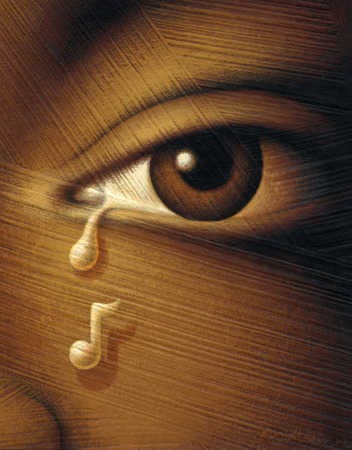Every Day There Are Tears
Every day I make people cry…
Hi friends,
Thanks for reading! If you enjoy today’s post… please share.
Did you know that if you hit the heart at the top or the bottom of this email you will make my day and it will make it easier for others to find this publication. Thanks!
It’s interesting to have a job where you make people cry on a daily basis. As a music therapist working in a hospital setting… this is me. Every day there are tears. There are many types of tears that I invoke; tears of sorrow, tears of fear and uncertainty, tears releasing tension, tears from experiencing and exploring pain, tears of joy, and tears from simply engaging in the beauty of an aesthetic experience. Tears every day.
It's not me personally provoking the tears. It’s the music. The music brings the tears. Music is emotion. Music creates and prompts an emotional response. (That is one of the reasons why music therapy works.) And when emotions are heightened, especially when in the ICU or oncology unit, the prompt of aesthetics—art, creativity, music—brings out emotion. This is a good thing.
In the hospital, patients, caregivers, family, friends, medical staff (yes, they cry too) are all holding in tension. Holding onto ‘something’ that is in need of a release. This is a high-pressure venue. Some things you can only hold in for so long. Cue the music. This could be a meaningful song, a soothing soundscape, a song of empowerment, something melancholy, or, when the purposeful tension in the music that is being created in the moment—initially matching the patient’s anxiety or pain—gradually moves to resolve. (When the minor moves to major, the dissonance to harmony, the tension to resolve… tears.) Release. Emotion.
Most times those who are experiencing the emotion are completely surprised by the outburst, sometimes embarrassed and apologetic. [Just yesterday a nurse, who was attending to a patient who was in pain and struggling, was surprised, and a little embarrassed, that she could not hold back tears when I brought in some music to help calm the room. It did not surprise me.] In just about all cases I always say, “It’s okay. It’s good actually. Something needs to come out. Something needs to be released.”
Oh, and sometimes I have tears too. I am also experiencing the music. [Often times, it feels like the music is just going through me, like a conduit, and I have no control over it.] Just like everyone else, it just happens. And yes, I’m surprised. (Not really.) But I’m not as embarrassed as much anymore. After all, sometimes I am also holding in tension—especially when connecting with someone who is in pain, or scared, or anxious, within a music experience. It’s a unique thing to feel yourself get ‘teary’ or expressing some emotion as part of your work. I’ve struggled with that, allowing myself to ‘release’ or express. You are not supposed to show emotion. You are a therapist. A clinician. Hold that in. Suck it up. However, I’ve come to terms with it. (And perhaps I ‘need’ it to be able to keep going every day.) After all, what makes this all work is the ‘connection’ and the empathy that the music creates between me and those who I work with. The connection on a creative and aesthetic level. We become ‘one entity’ while being ‘in’ the music together. [Research does show that those who connect within a music experience—a band, people singing together, purposefully listening to music together, attending a concert—their brain waves start to sync.]
So, perhaps I should say, it’s interesting to have a job where you make people, and yourself cry, on a daily basis.
When I entered the room, he looked at me and glanced off-puttingly at my guitar. He looked ‘stoic’, but I could see through it. I introduced myself and told him that the nurses asked me to come in and maybe play a little music - “Just to help you relax, give you something else to focus on.” He dismissively said, “I don’t care. If you want too.” I could see that speaking was laboring for him, so I just asked, “What kind of music do you like to listen to?” “I like anything from the Beatles to Radiohead. I like Foo Fighters.” So, I went into an easy version of Times Like These (Foo Fighters). “It’s times like these you learn to live again. It’s times like these you give and give again. It’s times like these you learn to love again…” Before I could get through the first verse… he was crying. And as I always do when this happens, I paused and asked, “Should I keep going?” And as they always say when I ask, he said… “Yes please.”
It’s not just the patients.
I went to visit an older woman in the ICU who had a stroke. She was minimally respondent and unable to focus or answer questions. I was asked to provide some music for comfort and orientation. Her daughter was sitting in the corner of the room and greeted me warmly. After telling her why I was there, I started to bring some music in. Initially I was just giving some soft music on the guitar, to see if I would get any response from her; visually or from the readings on the monitor. Her heart rate started to decrease slightly (good sign), so I continued, following her body-rhythm with the tempo of the muisic. After a bit, I merged into a ‘lullaby’ version of Edelweiss (from ‘The Sound of Music’). As I started singing, her daughter got up from her chair, went to the bed and took her hand… and started to cry.
Not too long ago, a nurse in the oncology unit who I’ve worked with for quite some time ‘jokingly’ said to me, “You play music for everyone else but what about us? How about singing me a song?” I said, a bit to her surprise, “Okay”, and behind the nurse’s station on the unit I took out my guitar and sang Your Song (Elton John). A few other nurses came over to also listen… and she started to cry. After I had finished and we all started going about our business, she came over to me and gave me a hug. She didn’t have to say anything.
There is so much emotion bottled up inside, for patients, caregivers and staff, (and me) and music prompts that release. It’s cathartic. It’s needed. When the stakes are high, music prompts emotion. Beauty and aesthetics prompts emotion. And it is a good thing. Sometime we all need to cry.
The healing power of music…
(*The stories presented in this blog are based on accounts or experiences and are not actual accounts or experiences.)
Raymond Leone, MMT, MT-BC is a board-certified music therapist based in Northern Virginia and writes extensively about music and wellness.





I'm a bit too old for the Foo Fighters to have been "music of my youth". I knew of "Times Like These" peripherally, but it really sunk in when I heard it on Glen Campbell's phenomenal modern covers album, "Meet Glen Campbell". I've always been a fan of his singing and guitar playing. I added this song to my favorite list, and find myself close to tears most times when I play it, whether in a piano bar or an online stream.
Glen continued to play concerts even in the early stages of Alzheimer's Disease. His family said it was when he most came alive during those years. We saw a concert on that final tour. It was painful at times, but always glorious.
I love it. Also, you made me cry. 😢🥰